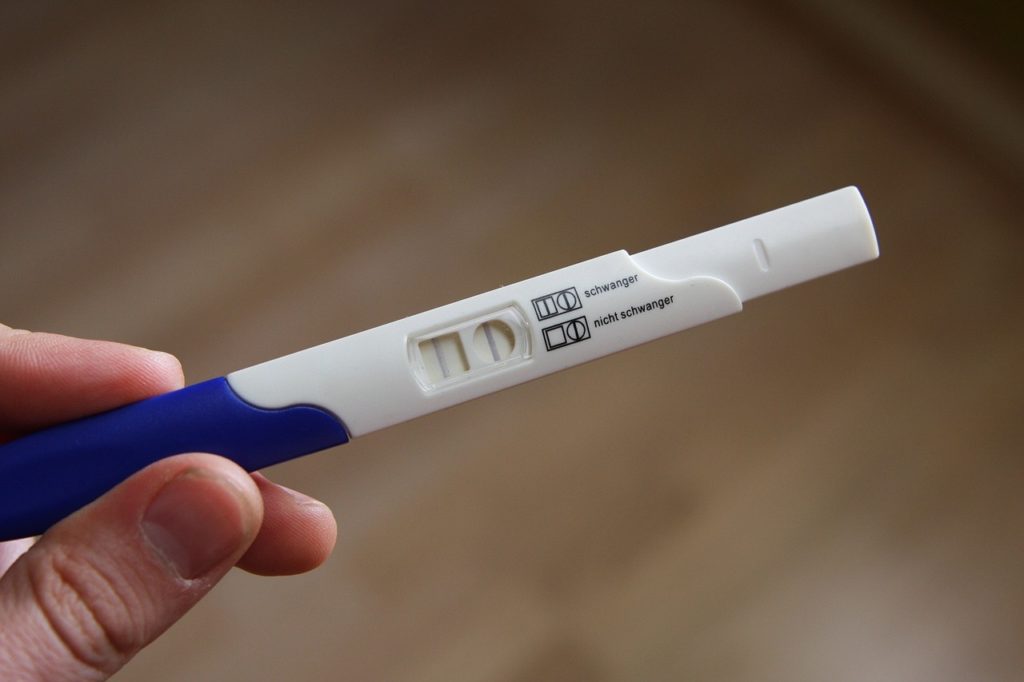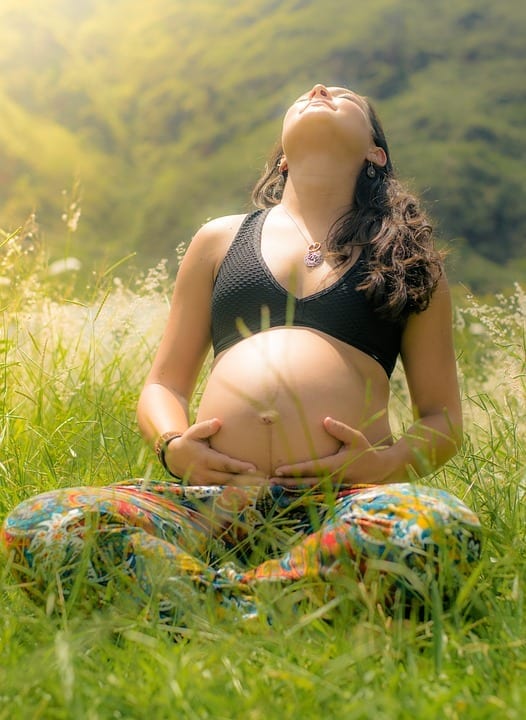Although there are some common pregnancy signs, the symptoms of pregnancy vary for each woman. While some women experience significant symptoms of pregnancy, other women may never even realize they are pregnant until they have missed one or more monthly periods. Pregnancy is different for each woman and can even be different for a woman.
Knowing the signs and symptoms of pregnancy is necessary to receive early prenatal care. An over-the-counter (OTC) pregnancy test can validate whether or not symptoms result from pregnancy. The most common symptom is a missed period for sexually active women. But not all women recognize this pregnancy sign since they may bleed even when pregnant.
Physical Signs of Pregnancy
Pregnancy signs and symptoms can begin as early as a week after conception. Women may notice that their breasts are swollen or tender to the touch and begin experiencing fatigue. Hormonal changes can trigger lower backaches, headaches, or abdominal cramps. Many women experience dizziness. All of these symptoms may be overlooked.
Most often, the first noticeable sign of pregnancy is a missed period. Although many women experience some bleeding during pregnancy, it is usually shorter and lighter than it is during a normal period. Even so, a missed period isn’t necessarily a sign of pregnancy. It can also signify other medical problems, such as hormonal imbalance, or it can be triggered by extreme stress.
It is usually about two to eight weeks after conception before morning sickness begins. Morning sickness is nausea with or without vomiting and doesn’t always happen in the morning. The degree of nausea varies from one pregnancy to the next. Some women don’t report nausea, while others suffer it throughout their pregnancy. Rapidly rising estrogen levels cause nausea. Many women have a sharp sense of smell and are sensitive to odors they have always been able to tolerate, such as cigarette smoke, strong perfumes, or mildew.
Breast Tenderness May Be One of the First Symptoms of Pregnancy
 Some women will have noticeable breast tenderness within the first few days after conception. Your hormones, estrogen and progesterone begin to increase rapidly, which already causes changes in your body. In some cases, the breast tenderness may be uncomfortable enough; even wearing clothing makes it more painful. Wearing loose-fitting clothing during that early stage of pregnancy might reduce some breast tenderness.
Some women will have noticeable breast tenderness within the first few days after conception. Your hormones, estrogen and progesterone begin to increase rapidly, which already causes changes in your body. In some cases, the breast tenderness may be uncomfortable enough; even wearing clothing makes it more painful. Wearing loose-fitting clothing during that early stage of pregnancy might reduce some breast tenderness.
Bloating or a Sense of Fullness is Also an Early Pregnancy Symptom
It is not uncommon for women to feel a sense of fullness or bloating (similar to how you might feel right before you get your period) in the early weeks of pregnancy. You might notice that your pants fit just a little tighter around your tummy or that your abdomen feels fuller than it usually does.
Missing Your Period is Often One of the Most Noticeable Signs of Pregnancy
If your periods are regular, missing a period may be one of the easiest ways to help you identify if you are pregnant. By the time you have missed a period, you could be about three weeks pregnant since conception most often occurs two weeks after the first day of your last menstrual period.
Light spotting can occur when your baby (called an embryo from week three to week eight) attaches to the wall of your uterus. If you notice light spotting at this time, you might think your period is lighter than usual, when in fact, this is a symptom of pregnancy.
Frequent Urination is Another Early Pregnancy Symptom
You might realize that you are going to the bathroom a lot more than usual and that your bladder feels fuller in the early weeks of pregnancy. Frequent urination in early pregnancy is one early sign of pregnancy.
Even though it is still too early for your expanding uterus to be heavily pressing on your bladder as it does in your last trimester, your bladder does become more sensitive and irritable in the early week of pregnancy. One reason is that the increased pregnancy hormones cause your renal pelvis and ureters to dilate. This is one reason why it feels like you need to urinate more frequently.
Nausea and/or Vomiting (or Morning Sickness) is a Pregnancy Symptom that Occurs Around Six Weeks
If you have missed some of the earlier signs of pregnancy, chances are good you will not miss morning sickness as a sign of pregnancy unless you think you have the stomach flu. Most women begin to experience morning sickness by the sixth week of pregnancy, which may last until about 12 weeks or later. The good news is that morning sickness typically improves as your pregnancy progresses.
A Recap on How to Know You May be Pregnant
Some of the other early symptoms of pregnancy include:
- weight gain with no other causes
- nausea or vomiting (particularly in the morning)
- slight bleeding or cramping, but less than a “normal period.”
- fatigue
- loss of appetite or food aversions
- hormonal imbalances leading to mood swings
- swollen or tender breasts
- backache
- headache
- increased frequency of urinating
- constipation
- dizziness
Although some women experience these early signs of pregnancy in the first week or two after conception, others may never experience any of them. Especially for women who aren’t actively trying to become pregnant, early pregnancy symptoms can go unnoticed at first.
Emotional Signs of Pregnancy
Even without physical symptoms, some women “feel pregnant.” This is often recognized as women’s intuition and is often the first indicator of pregnancy for a woman.
Pregnancy can trigger emotional signs and symptoms as well. The first emotional reaction in some women is just awareness, a sense that something has changed. Many women say they “just knew” they were pregnant.
Mood swings are common among women in the first trimester, and many become emotional and weepy. Women may attribute feelings of irritability to premenstrual syndrome and may dismiss them. Mood swings can include feelings of exhilaration and excitement.
Confirming Pregnancy
These very early symptoms aren’t proof of pregnancy. They may also indicate that the woman is becoming ill or that her period is about to start. Some women experience no symptoms at all. The only way to know for sure is to see a doctor or take an at-home pregnancy test.
Taking a Home Pregnancy Test to Identify if You are Pregnant
One of the best ways to identify if you are pregnant is to take a home pregnancy test. Home pregnancy tests are more accurate if you take them after you have missed a period and if you take them first thing in the morning. It is important to note that home pregnancy tests are not always accurate, and you may get what is known as a false negative.
It is possible, for example, for the result to show that you are not pregnant when in fact, you are pregnant. If you continue to have pregnancy symptoms even when your home pregnancy test is negative, be sure to see your care provider or visit your local health clinic.
Pregnancy Test and Early Prenatal Care
A pregnancy test is essential if there is any suspicion of pregnancy. Accessing early prenatal care is vital to the child and the mother. For example, most pregnant women need an increased consumption of folic acid as early as possible to help prevent birth defects. Prenatal vitamins early in pregnancy are also crucial to the growth and development of the unborn baby. Some doctors may prescribe fish oil during pregnancy to stimulate and promote healthy nerve and brain function.
Whenever there is a suspicion of pregnancy, it’s crucial to obtain a pregnancy test as soon as possible. The next step is to talk to a qualified doctor or healthcare professional. The advice and recommendations of a qualified healthcare professional are essential in the early stages of pregnancy to help the baby grow and develop as healthily as possible.
And just like any medical condition, only a doctor should diagnose, prescribe, and provide medical advice to women who are, or who may be, pregnant. Early prenatal care is essential for the healthiest pregnancy possible.






Be the first to comment on "How To Recognize Very Early Signs and Symptoms of Pregnancy"